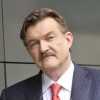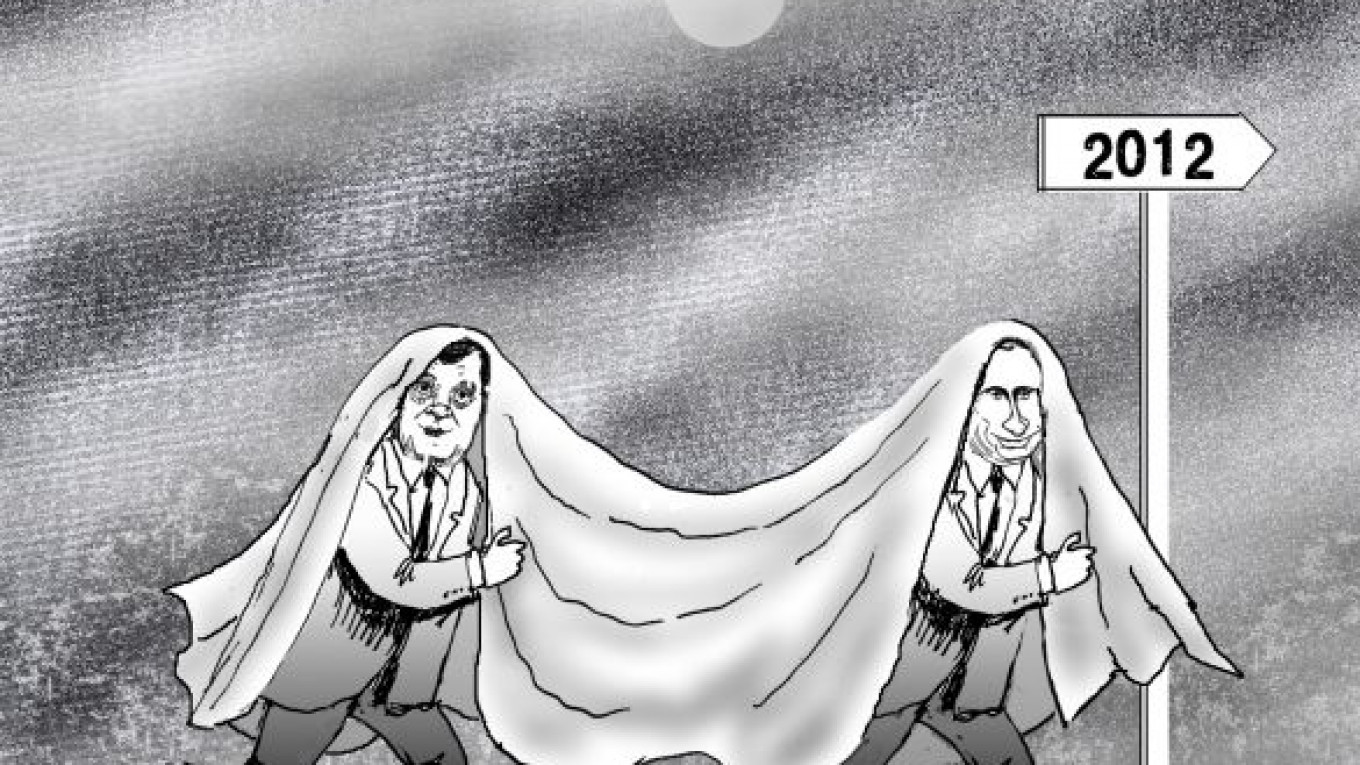Despite the cheery promises of the authorities, it seems that the wildfires that have caused a real environmental catastrophe will not end for at least another three weeks — that is if you believe the U.S. State Department’s warning to Americans to think twice about traveling to Russia before Sept. 5. Perhaps the warning stems from the fact that the State Department — in contrast to senior Russian officials like chief public doctor Gennady Onishchenko and members of the state meteorological service — is accustomed to behaving more responsibly toward citizens.
Indeed, Russian authorities do not even try to hide the fact that they treat their citizens as idiots — or cattle. For sheer outrageousness, Mayor Yury Luzhkov’s belated return from vacation says it all. Luzhkov, who has been entrenched in the Mayor’s Office for 18 years, vacationed for an entire week while Moscow choked on smoke and fumes. Can you imagine former New York Mayor Rudy Giuliani staying away on vacation following the Sept. 11, 2001, attacks?
Whatever you might think of the terror, food shortages and economic stagnation under Soviet leaders Josef Stalin, Leonid Brezhnev and Yury Andropov, at least factory directors were expected to be on the job when something went wrong. A former aide to Andropov once told me about a man who served as what today would be called a deputy prime minister. During a Politburo session discussing an emergency at the construction site of the Atommash factory, where the foundation had suddenly begun to sink, it emerged that the official, who was responsible for the plant, had not yet visited the site of the disaster. Upon hearing this, Andropov proposed that the official be fired and expelled from the Communist Party immediately — perhaps the worst possible punishment at that time. His order was carried out promptly, and the official retired in disgrace.
I am in no way suggesting that the supreme body of a ruling party should deal with purely economic issues, even in emergencies, or punish or pardon guilty officials. But when I saw how the leader of our current ruling party, Prime Minister Vladimir Putin, praised Luzhkov on Tuesday for his decision to cut his vacation short, I could only throw up my hands in astonishment and despair. But my hands involuntarily rose even higher when I saw a news program on state television shortly afterward that showed Putin taking the co-pilot’s seat in a firefighting aircraft and personally dousing two fires. It revealed a total lack of tact and understanding on the part of both Putin and the people who dreamed up the stunt. To paraphrase Alexander Pushkin: “God forbid you should see Russian PR — it is mindless and crass!”
But most Russians eat this stuff up. No quantity of fires — which demonstrate the helplessness, inefficiency and deceitfulness of the authorities, along with the enormous chasm separating them from the people — are capable of changing the public’s adulation for Putin. If a presidential election were held this weekend, Putin would waltz into the top spot.
In recent weeks, the smoke from the fires has eclipsed other topics in Russia’s political life. But that haze will eventually dissipate, and the main question will come to the fore once again: Who will win the presidential election in 2012? Last week, the debate flared up again after President Dmitry Medvedev hinted that the presidential candidate from the ruling party might not be himself or Putin, but a third person. The best analytical minds frantically attempted to comment on this unexpected statement, apparently forgetting that about four years ago Putin suggested that voters would get to choose from among as many as five worthy candidates in the 2008 presidential election. Oh, how that statement tested the analytical abilities of political commentators, myself included. Some went so far as to suggest that Putin intended to introduce some competition into politics, allowing voters to choose between two candidates loyal to the president.
I also distinctly remember another instance, in August 2007, when many analysts believed that then-Prime Minister Mikhail Fradkov would retire and Sergei Ivanov would be appointed in his place for the purpose of becoming Putin’s successor. When, a month later, an unknown Viktor Zubkov was appointed to replace Fradkov, the same people confidently predicted that Zubkov would be the next president. But as we know, Medvedev was appointed as the presidential candidate.
I also remember the speculation about what job Putin would take after his second presidential term ended. One prominent political analyst even suggested that Putin, who successfully pushed through Sochi’s bid to host the 2014 Winter Olympics, had reached an agreement with influential sports officials to replace Jacques Rogge as president of the International Olympic Committee. As it turned out, however, Putin had concentrated so much power in his own hands that it was not particularly important which job he took after the Kremlin — prime minister, State Duma speaker or head of United Russia. For the ruling class, he has remained “the boss,” as he is called behind his back.
Does this mean that the 2012 scenario will play out the way most commentators now expect, with Putin returning for a six-year term as president? Will Medvedev depart for St. Petersburg to become the chief justice of a revamped U.S.-style Supreme Court that combines the three current top courts: the Constitutional Court, the Supreme Court and the Supreme Arbitration Court? My sources confirm that such a project is in the works, and its implementation would be a sure sign that things are progressing along the lines of the above scenario.
But whatever happens will depend largely on Putin himself and the agreement, if any, that he reaches with Medvedev. But these are not the only variables. In all likelihood, the political and business elite, however timid and servile they might be, will silently but desperately resist any reshuffle at the highest levels. After all, a reshuffle would result in a new, unknown political landscape that alters the rules of the game — just after the elite had finally gotten used to the present arrangement. The current ruling tandem is, if not perfect, at least functional, and nobody, including Putin, wants to shake things up too much for fear of only making the situation worse. The real power is in Putin’s hands, and Medvedev, with no plans to challenge him, would prefer to let that model of government continue. Toward that end, Putin and Medvedev will keep the ruling class in the dark right up until the last minute. Otherwise, the stability of the duumvirate could falter. If it were to become known that Putin had no intention of running for president, he would inevitably lose some of his current charisma that stems from his being perceived as an all-powerful prime minister and as the future president. If it came out that Medvedev is not going to seek re-election, he would not be taken seriously at all.
In the end, Putin might be thinking that he could return to the Kremlin in 2018. He would then be 66, but that is not too old for a politician who takes good care of his health like he does. Does that sound far-fetched? Unfortunately, history shows that authoritative regimes — especially in resource-rich countries without strong democratic traditions — can remain in power for decades. No wildfires or other natural or social disasters can reverse this trend.
Should Putin stick around, you can forget about modernization in Russia. And even if he doesn’t, please don’t tell me you have actually taken all those promises seriously.
Yevgeny Kiselyov is a political analyst.
A Message from The Moscow Times:
Dear readers,
We are facing unprecedented challenges. Russia's Prosecutor General's Office has designated The Moscow Times as an "undesirable" organization, criminalizing our work and putting our staff at risk of prosecution. This follows our earlier unjust labeling as a "foreign agent."
These actions are direct attempts to silence independent journalism in Russia. The authorities claim our work "discredits the decisions of the Russian leadership." We see things differently: we strive to provide accurate, unbiased reporting on Russia.
We, the journalists of The Moscow Times, refuse to be silenced. But to continue our work, we need your help.
Your support, no matter how small, makes a world of difference. If you can, please support us monthly starting from just $2. It's quick to set up, and every contribution makes a significant impact.
By supporting The Moscow Times, you're defending open, independent journalism in the face of repression. Thank you for standing with us.
Remind me later.







